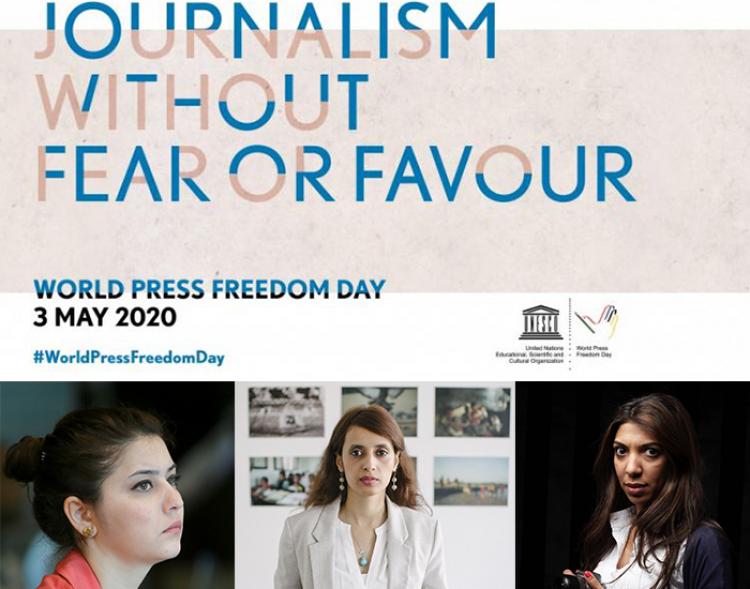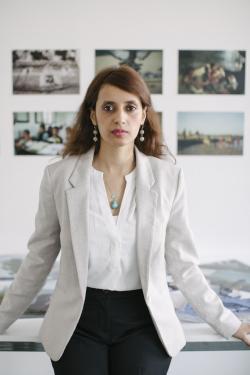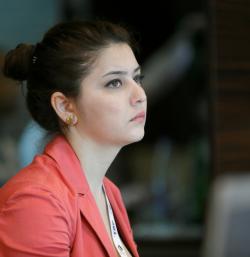Journalism without fear or favour - on #WorldPressFreedomDay 2020

Zamira Abbasova, Nazeeha Saeed and Amira Al Sharif were taking part in a panel organised by ICORN at the World Press Freedom Conference scheduled to take place in the Hague 22-24 April. Sadly, due to the Covid-19 pandemic, the conference has been postponed until October. However, the importance to uphold press freedom and guard the gatekeepers of truthful information becomes even more precarious during these extraordinary times, where "doctors, nurses and facts are lifesavers", and where governments are using the pandemic to justify surveillance and impose harder restrictions on journalists and opposition.
To mark the World Press Freedom Day, we spoke with the three panelists about media freedom, work conditions for journalists in their home countries, Azerbaijan, Bahrain and Yemen. And about working as a journalist in exile and during the Covid-19 pandemic. In video and text below.
Nazeeha Saeed - Journalists deserve to be free to tell the truth
Zamira Abbasova - Many journalists from Azerbaijan feel abandoned by International Media as Post-Soviets are slowly becoming a non-interest factor
Additional to the video interview:
What can the international community and media do to support journalists still in Azerbaijan, and in exile?
Many exiled journalists find themselves in a stalemate when they move to a new country. New culture, new job market, a new language, differences in educational qualifications make it really hard particularly for women journalists to find relevant jobs. Foreign media does not employ them as they are not based in the home country physically. Local media does not want to hire another foreign correspondent as in Europe we are facing a huge cutback in foreign correspondence budget, and besides, lack of strong recommendations or appealing publications in world-known media prevent exiled women from continuing their career as a journalist. Although many migration integration organizations recommend finding starting jobs until newcomers get their language skills developed, let's face it, learning foreign languages is hard enough, leave alone reporting in the newly acquired language that normally takes from 3-5 years.
For journalists working in exile
I have talked to several Azerbaijani journalists currently living in Europe and they all have confirmed ideas that could be a solution to the unemployment problem of the exiled women journalists:
- Creating an organization or an initiative that could broker between the foreign media and the exiled journalists for stable article/research/report submission and advocate for them;
-Working budget for translation services to enable them to write articles for local newspapers as well;
- Organizing internships in local newspapers and TVs;
- Being invited for occasional guest publishing in foreign media;
- Annual working budget available for research and publications
For journalists working inside Azerbaijan
Many journalists from Azerbaijan complained that they feel abandoned by International Media as Post-Soviets are slowly becoming a non-interest factor. Some of the journalists who are still in the country have suggested the following measures to support journalists still trying to work inside the country:
- Distant research positions in foreign newspapers;
- Digital journalistic fellowship and residencies with foreign media;
- Mentorship from experienced journalists to create high-quality content;
- Annual budget allocated for local journalists for creating localized content from regions of the country;
- One organization that could be our go-to for all of this help.
Amira Al Sharif - In Yemen, journalists are at risk if they write, and still at risk if they don't - a painful paradox
An interview with Amira Al Sharif:
What are the conditions in Yemen (for journalists) in terms of freedom of expression?
Neither the internationally recognized government in the south of Yemen, nor the rebel-led government in the north, took any real precautious measures towards the coronavirus as it ravaged country after country, inching closer and closer to Yemen. Since the coronavirus was named a pandemic on March 11, journalists in Yemen and around the world - myself included, updating myself hourly and daily with the latest news – could never believe that there wasn’t a single reported case in my country. Then on April 10, we officially joined this terrifying pandemic, weeks after our regional neighbours and most of the world. On top of this “state of denial” of the governments, journalists both inside and outside our borders had to write their reports as “Yemen braces for the coronavirus” because of a lack of access to reliable official data and sources.
For journalists, it has been difficult to obtain confirmed information from Yemeni doctors, as they seemed to be prohibited from making statements. Which brings me to press freedom and, more importantly, freedom of expression in my country: Unfortunately, as a journalist you are treated as affiliated with either this warring party or that warring party, as if you are fighting for either side, as if your camera is a weapon. So, if you criticize a warring party while living and working on their part of the battle-lines, you risk intimidation, arrest, disappearance, torture, even execution. I’ve been told from my sources in Yemen how in the north, punishment awaits anyone who write or speak publicly about the virus in ways that diverged from the official line. So, journalists spoke anonymously to international outlets about the virus, while at home they had to choose between self-censorship and potentially deadly consequences.
What is important to you as a journalist in general and during this time of the pandemic?
As a journalist, it's always of great importance for me to find light in the darkness, both in wartime and now corona time. That light is often an intimate truth. But having to work in a climate where both the journalist and her sources have to choose between self-censorship, deadly consequences, and intimate truth, is tricky to say the least.
A genuine ceasefire is important to me on both a personal, human level and professional, journalism level. Yemen is now in her sixth year of war. More than 12,000 Yemeni civilians have been killed in directly targeted attacks, with more than 85,000 children under the age of five now dead from war-induced hunger and disease.
My worst nightmare is that this virus will hit my people as hard or even harder than the war. As a journalist, it's always of great importance for me to find light in the darkness, both in wartime and now corona time. That light is often an intimate truth. But having to work in a climate where both the journalist and her sources have to choose between self-censorship, deadly consequences, and intimate truth, is tricky to say the least. As Yemen enters her second month of corona, will journalists be able to deliver us the truth, both the light and dark parts, free from persecution? They say a ceasefire can help pave the way for a more liveable reality, but also a just society.
In this time of corona, I feel all-consuming urgency to reach worldwide audiences with stories from Yemen. Flexibility, perseverance, and vision are my keys at the moment while I figure out new modes of storytelling and dissemination, which seems in touch with our shared global reality of "new normals."
Since I am no longer working in the field in Yemen, I have been focused on getting stories from my archive filled with over a decades-worth of images to the international media. After initial success with a few major outlets with worldwide audiences, it has become increasingly difficult to continue as publications want new work. In this time of corona, I feel all-consuming urgency to reach worldwide audiences with stories from Yemen. Flexibility, perseverance, and vision are my keys at the moment while I figure out new modes of storytelling and dissemination, which seems in touch with our shared global reality of "new normals."
How is it possible reach out to the people in Yemen?
I speak with Yemeni journalists who are working there right now. They tell me that they cannot do much more than raise their family and friends' awareness of the looming coronavirus crisis because reporting on it for the media will put their lives at risk. They are at risk if they write, and still at risk if they don't — a painful paradox.
They [journalists] are at risk if they write, and still at risk if they don't — a painful paradox.
Reaching the people of Yemen is often restricted to three methods, they say. First, through social media, which is obstructed by deception and intimidation from authorities. Second, through first-hand, in-depth reporting in the field for outlets, which makes you even more vulnerable to arrest or worse.
Third, by undercover reporting and anonymous sources, which is, again, terribly tricky and risky.
What does the future hold for journalism in Yemen - and outside?
The future was already digital, but even more so now, as health experts, economists and world leaders say that "social distancing measures will be the new normal" until further notice. Life, love, and work will increasingly and necessarily unfold across time and space and computer networks.
Can your future be digital, too, if your past and present and foreseeable future include widespread food insecurity, extreme poverty, various disease outbreaks, critical civilian infrastructure in ruins — in short, humanitarian catastrophe?
In Yemen, as in developing nations, especially the war and crisis-ravaged ones I fear will be left behind and forgotten once again. Can your future be digital, too, if your past and present and foreseeable future include widespread food insecurity, extreme poverty, various disease outbreaks, critical civilian infrastructure in ruins — in short, humanitarian catastrophe?
As the UN secretary general said late last month, before calling for a global coronavirus ceasefire, we must "end the sickness of war." Imagine a global ceasefire? It's harder to imagine a global ceasefire than the global spread of a deadly virus, for me at least, but I think that this corona time — just like wartime — helps us stop and reconsider. How we need a more balanced, compassionate, and prepared future. How the future is global, so mutual respect, understanding and solidarity are required for a world that's safer and brighter for everyone, not just for some or a few. How priority should be given to our health sector as this pandemic won't be our last. How we've crossed the limits of mother nature, intervening in the natural world in unnatural ways, and how She needs us to be more creative and less destructive towards her. How, if united and sincere, we can end virus and hunger pandemics as well as the sickness of war.
Latest news
-
23.04.24
-
18.04.24
-
04.04.24
-
26.03.24
-
21.03.24

Amira Al-Sharif is an independent Yemeni photojournalist with over seventeen years of experience documenting the beauty and suffering of her beloved country. Her work has been published in Yemeni newspapers as well as internationally with National Geographic, the Washington Post, and the Guardian. She has worked on assignments for UNICEF, UNHCR, and Oxfam, and received multiple prizes, fellowships, and nominations; from the World Press Photo Foundation, Women Photograph, the Prince Claus Fund along with the Arab Fund for Arts and Culture, Samir Kassir Foundation and Free Press Unlimited’s “Most Resilient Journalist Award”. Al Sharif is currently ICORN writer-in-residence in Paris City of refuge.

Zamira Abbasova is a journalist podcaster from Azerbaijan. She comes to journalism from long-standing political activism and peacebuilding backgrounds. When it became unbearable to practice either one, she turned to journalistic practice and trained young people to start their own activistic radio stations in Azerbaijan. She also created the first peace radio in the South Caucasus region along with other peacebuilder women from Armenia and Georgia. Talk shows that covered different ranges of subjects among these three women created strong opposition in the Azerbaijani government forcing her to flee from the country in 2015. Zamira is an occasional publisher at London's Morning Star newspaper She is an ICORN's writer in residence in Leiden, the Netherlands. Currently, she serves as an editorial member of LeidsCement, a cultural platform of city Leiden as a cultural journalist.

Nazeeha Saeed is a journalist and safety trainer from Bahrain, and was the first reporter to challenge the human rights abuses of the Bahraini government through the legal system after its harsh crack-down on protesters in 2011. She is an award-winning journalist, a leading human rights defender and women’s rights advocate. For more than 12 years, Saeed has worked as a correspondent for international media outlets such as French TV news channel France24, the international broadcaster Radio Monte Carlo Doualiya Arabic service, the cultural and political magazine Raseef22 and the Alhayat daily. Facing continuous harassment, Saeed left Bahrain shortly after they lifted her travel ban and became ICORN writer-in-residence in Paris City of refuge in 2017. Today, Saeed is based in Berlin where she works as a freelance journalist and reporter.






